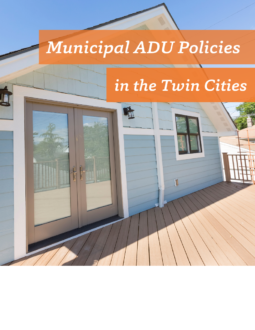Municipal ADU Policies in the Twin Cities
Accessory Dwelling Units (ADUs), also called granny flats or backyard cottages, are a unique housing form created by individual homeowners and scattered throughout neighborhoods. They are adjacent or attached to a primary home and have their own entrance, kitchen, bathroom, and living area. As the region’s shortage of affordable housing worsens, ADUs present a flexible, neighborhood-scale solution to our housing needs. If ADUs became as common in the Twin Cities as they are in Portland, OR (about 1.5% of single-family lots), the region would create 11,000 new housing units.
Local government policies can make a critical difference in whether ADUs can reach their full potential for communities. In 2014, the City of Minneapolis made changes to zoning codes to allow more ADUs to be constructed in the city, and as of 2019 the city has permitted 137 new ADUs. Other municipalities throughout the region have policies that affect a homeowner’s ADU project, such as zoning policies, parking requirements, and owner-occupancy requirements. This overview of Twin Cities policies can help homeowners understand the relevant policies in their area and can help policymakers understand which ADU policies exist as well as where there is a need for ADU policy change.
Are you a homeowner interested in building an ADU? Read our guidebook.
Are you a policymaker interested in what municipalities can do to make ADUs easier for homeowners to build? Take a look at our policy brief.
